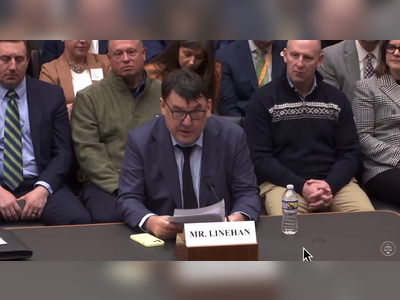
A political agreement has been reached among the congressional leaders to avoid a US government shutdown
The agreement, however, still has to be voted on by the representatives.
Leaders of the United States Congress have reached an agreement on the main figures of the federal budget, which could prevent a government shutdown in the coming weeks, announced House Speaker Mike Johnson on Sunday.
The agreement, amounting to nearly $1.6 trillion, still requires the approval of the members of Congress. The negotiated funds include $886 billion allocated for defense spending and will ensure the financing of government necessities until the end of the fiscal year.
This budget consensus closely aligns with the compromise made last year between the White House and the House of Representatives, which was part of the discussions to raise the debt ceiling.
While the agreement includes stipulations for certain reductions in additional expenditures, Speaker Johnson acknowledged that the proposed cuts might seem insufficient to some. He was referencing a faction of Republican representatives who are demanding more significant spending cuts in exchange for their votes on the budget and are calling for definitive actions from the administration to protect the nation's borders.
Democratic leaders of Congress, Senate Majority Leader Chuck Schumer and House Democratic Caucus Chairman Jeffrey Hakeem, have stated in a joint release that the agreement should clear hurdles for maintaining the financing of vital government priorities.
President Joe Biden described the agreement on the main budget figures as a step toward avoiding a government shutdown and as essential for the protection of "important national priorities." In his statement, he also indicated that it's now up to Republican representatives to either accept or reject the arrangement.
The existing funding for U.S. government institutions expires on January 19 and, for some agencies, in February. Without a new budget, there is a looming threat of a government shutdown.
Before it can reach the President's desk for a signature, the budget agreement must be voted on and approved by the members of Congress.
The agreement, amounting to nearly $1.6 trillion, still requires the approval of the members of Congress. The negotiated funds include $886 billion allocated for defense spending and will ensure the financing of government necessities until the end of the fiscal year.
This budget consensus closely aligns with the compromise made last year between the White House and the House of Representatives, which was part of the discussions to raise the debt ceiling.
While the agreement includes stipulations for certain reductions in additional expenditures, Speaker Johnson acknowledged that the proposed cuts might seem insufficient to some. He was referencing a faction of Republican representatives who are demanding more significant spending cuts in exchange for their votes on the budget and are calling for definitive actions from the administration to protect the nation's borders.
Democratic leaders of Congress, Senate Majority Leader Chuck Schumer and House Democratic Caucus Chairman Jeffrey Hakeem, have stated in a joint release that the agreement should clear hurdles for maintaining the financing of vital government priorities.
President Joe Biden described the agreement on the main budget figures as a step toward avoiding a government shutdown and as essential for the protection of "important national priorities." In his statement, he also indicated that it's now up to Republican representatives to either accept or reject the arrangement.
The existing funding for U.S. government institutions expires on January 19 and, for some agencies, in February. Without a new budget, there is a looming threat of a government shutdown.
Before it can reach the President's desk for a signature, the budget agreement must be voted on and approved by the members of Congress.
AI Disclaimer: An advanced artificial intelligence (AI) system generated the content of this page on its own. This innovative technology conducts extensive research from a variety of reliable sources, performs rigorous fact-checking and verification, cleans up and balances biased or manipulated content, and presents a minimal factual summary that is just enough yet essential for you to function as an informed and educated citizen. Please keep in mind, however, that this system is an evolving technology, and as a result, the article may contain accidental inaccuracies or errors. We urge you to help us improve our site by reporting any inaccuracies you find using the "Contact Us" link at the bottom of this page. Your helpful feedback helps us improve our system and deliver more precise content. When you find an article of interest here, please look for the full and extensive coverage of this topic in traditional news sources, as they are written by professional journalists that we try to support, not replace. We appreciate your understanding and assistance.











